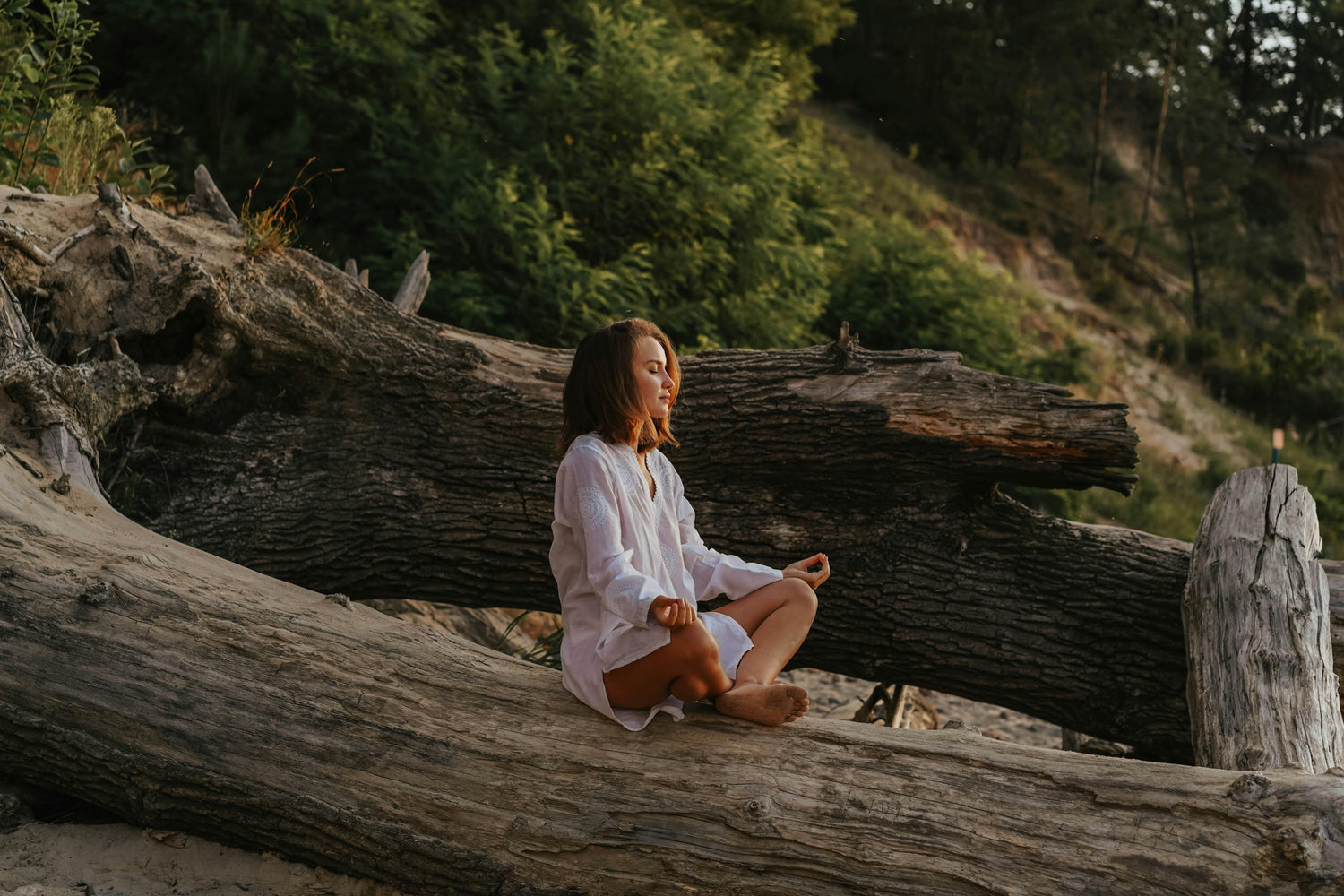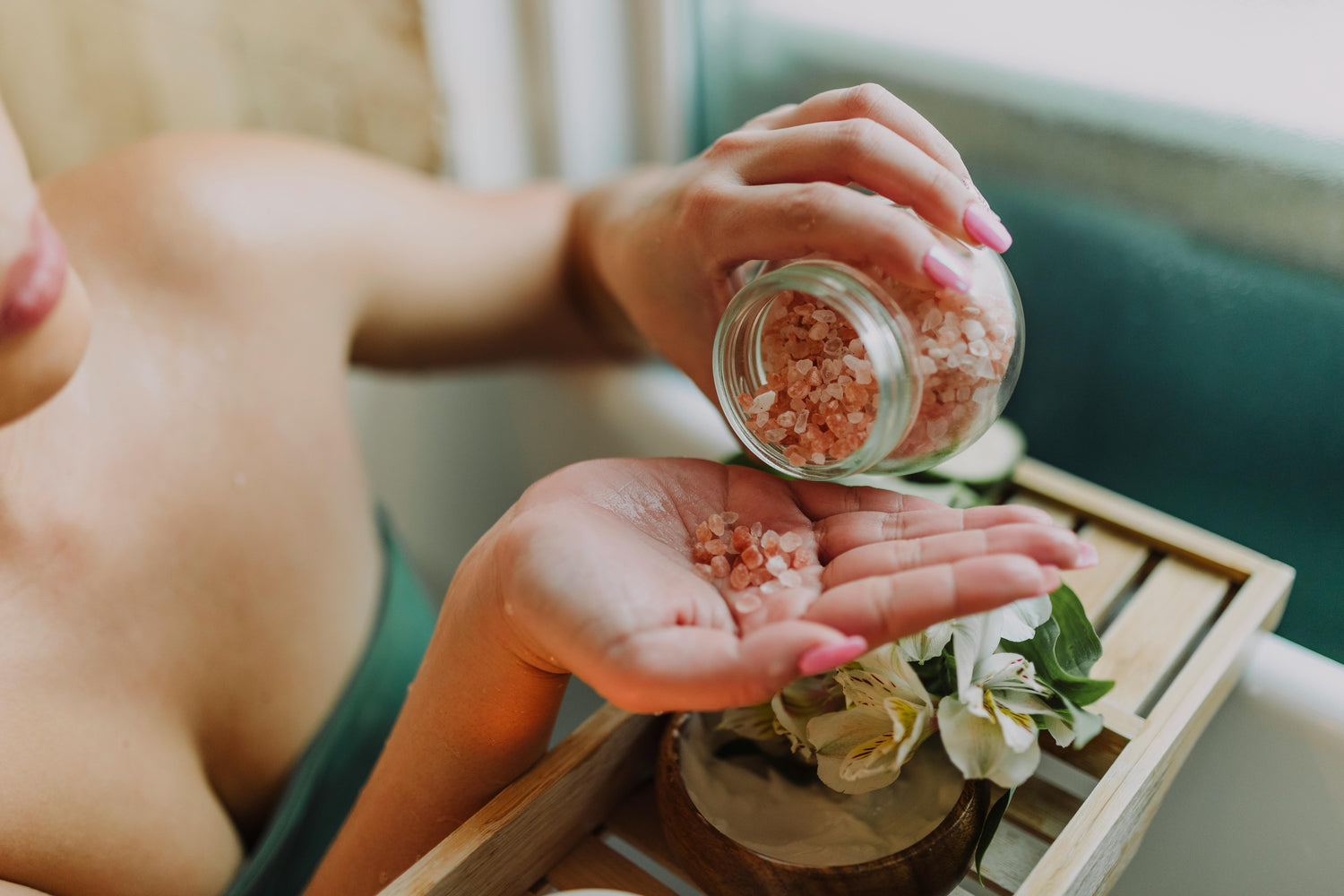YOGA AND SELF-LOVE : CULTIVATE INNER BALANCE FOR AN AUTHENTIC VALENTINE'S DAY
February is often associated with love and Valentine's Day , but love isn't limited to romantic relationships.
Many people feel pressure, loneliness, or high expectations during this time.
Yoga and meditation offer a path to self-love, acceptance and inner kindness .
Written by Valentine - February 2025
Collapsible content
Reading time
About 10 minutes
WHAT YOU ARE ABOUT TO DISCOVER
- Why self-love is essential to well-being and inner balance.
- Yoga poses to build confidence and open the heart.
- Breathing and meditation techniques to calm the mind and generate kindness.
- Simple rituals to cultivate authentic self-love every day.
- How yogic philosophy guides us toward a healthier relationship with ourselves and others.
- "Let's take a look"!

SELF-LOVE: AN ESSENTIAL PRACTICE FOR WELL-BEING
Self-love is often misunderstood as selfishness or narcissism. Yet, it is the foundation of a stable emotional and mental balance . In yoga, the philosophy of Ahimsa , which means "non-violence," teaches us that the first person we must be kind to is ourselves. Without this inner kindness, it becomes difficult to offer others a healthy and authentic relationship.
Connecting to self-love involves, above all , accepting your body and mind as they are , with their strengths and weaknesses. However, in our daily lives punctuated by professional and social demands, we often tend to judge ourselves harshly: "I am not efficient enough", "I do not do enough sport", "I should be more productive" . Yoga reminds us that these thoughts are only constructions of the ego and that it is essential to observe them without identifying with them.
In physical practice, each posture becomes an opportunity to listen to and respect one's body . Rather than forcing a posture to achieve an ideal, the yogi learns to honor their limits , adjust their breathing, and experience the well-being of movement. For example, gentle practices like Yin Yoga or slow Hatha Yoga help reduce pressure and foster a caring connection with oneself.
From a scientific perspective, self-love has a direct impact on the nervous system. Psychological studies have shown that practicing loving-kindness meditation (Metta Bhavana) reduces activity in the amygdala, the area of the brain responsible for stress and anxiety responses. In other words, speaking to yourself with kindness and gratitude instead of self-criticism reduces stress and improves emotional resilience.
Let's take the example of a person practicing yoga to overcome burnout . Rather than approaching the discipline with a performance objective, they will gradually learn to listen to their body, to focus on the quality of their breathing and to integrate moments of rest into their daily life. This transformation goes beyond the yoga mat : it is reflected in the way he approaches his days, in his ability to say no without feeling guilty, and in his attitude towards his own emotions.
Self-love is not a fixed state but a practice to be cultivated daily . By incorporating moments of yoga, meditation and gratitude , each person can gradually build a healthier relationship with themselves, without seeking external validation. The more we treat ourselves with respect and kindness, the more we become able to bring this energy to others.

YOGA POSTURES TO GROUND YOURSELF AND STRENGTHEN SELF-LOVE
The body is the first refuge of our inner well-being. Yet, we often tend to judge it, neglect it or push it beyond its limits , influenced by standards of performance and appearance. Yoga offers a different approach: reconnecting with your body gently , listening to it and respecting it. Cultivating self-love also involves the way we inhabit our body, and certain postures allow us to find this deep anchoring and this feeling of inner stability.
Yoga postures can be seen as a body language of trust and acceptance . By working on grounding, openness, and stability, they help develop a sense of inner security , while encouraging a more aligned and relaxed posture. Practicing with kindness and without judgment fosters a better relationship with oneself , free from external comparisons and expectations.
Concrete examples of postures to strengthen self-esteem
- Anahatasana (Melted Heart Pose) to open your heart to yourself
This posture, stretching the chest and shoulders, invites you to release emotional tension and welcome more space in the heart region. It symbolizes openness to love and kindness , both towards yourself and others.
Yoga Benefits : By relaxing the upper body, this posture releases retained emotions and promotes a feeling of calm and relaxation. - Vrksasana (Tree Pose) to cultivate inner stability
Self-love is about a balance between trust and grounding . Tree pose requires finding your center, remaining stable despite imbalances , just as in life.
Yoga Benefits : This pose strengthens concentration, patience, and the ability to stay grounded in the face of external challenges. When practiced regularly, it develops resilience and confidence. - Balasana (Child's Pose) to take a relaxing break
Sometimes the best way to love yourself is to embrace rest . Child's pose symbolizes letting go, returning to yourself, and finding security . It reminds you that taking time for yourself is an essential need, not a luxury.
Yoga benefits : It soothes the nervous system, reduces anxiety and allows you to reconnect with a feeling of comfort and inner gentleness.
Incorporating these postures into a regular practice helps strengthen the mind-body connection , encourage a more open posture, and cultivate a sense of confidence and self-respect . By practicing with intention and kindness , each movement becomes an act of self-love.

PRANAYAMA AND MEDITATION TO CULTIVATE INNER GENTLENESS
Self-love is not limited to external gestures or positive affirmations; it is also cultivated in the inner space, through breath and mindfulness . Our breathing directly reflects our emotional state: when we are stressed, it becomes short and jerky; when we are relaxed, it naturally lengthens. In yoga, pranayama (breath control) is a powerful tool for regulating energy, calming mental tension, and promoting a gentler and more caring inner dialogue .
Similarly, meditation allows us to observe our thoughts without judgment and learn to speak to ourselves with more compassion . Too often, we allow ourselves to be overwhelmed by self-criticism and external demands. Meditation helps us detach ourselves from these limiting thoughts , bringing our attention back to the present moment and to self-acceptance.
Concrete examples of techniques for cultivating inner gentleness
- Nadi Shodhana (Alternate Nostril Breathing) to rebalance energy
This breathing technique involves alternating inhalation and exhalation between the two nostrils, which helps harmonize the cerebral hemispheres and calm the nervous system . It is ideal for regaining a state of serenity and mental clarity.
Yoga Benefits : By balancing the breath, this practice reduces anxiety, promotes better concentration and prepares for a state of deep relaxation. - Bhramari (Bee Breath) to release emotional tension
This vibratory breathing, where a gentle humming sound is produced as you exhale, instantly soothes the mind and releases accumulated tension . Its calming effect is particularly beneficial for those who tend to be hard on themselves or who experience emotional stress.
Yoga Benefits : By calming the activity of the amygdala (the stress center in the brain), this breathing promotes relaxation and improves the quality of sleep. - Metta Bhavana Meditation (Loving-Kindness Meditation) to Cultivate Self-Love
This meditation involves repeating kind phrases to yourself and then extending them to others. Phrases like "May I be at peace, may I be safe, may I be happy" help you develop a kinder, more compassionate relationship with yourself .
Yoga Benefits : This meditation improves self-esteem, strengthens gratitude and helps free oneself from negative thought patterns.
Incorporating pranayama and meditation into a daily routine helps reconnect with fluid breathing and a more peaceful state of mind . Taking a few minutes each day for these practices becomes a true ritual of self-love, an invitation to slow down and cultivate a caring presence towards oneself .

SELF-CARE RITUALS TO HONOR YOUR BODY AND MIND
Self-care shouldn't be seen as an occasional reward, but as a daily commitment to your physical and mental well-being . Too often, we give time and energy to others without ever giving ourselves the same attention. Self-care is an essential form of self-love that allows us to refocus, recharge, and strengthen our inner balance .
Self-care rituals are not only enjoyable moments, they are also mindful practices that embed a powerful message : "I deserve time and attention." By combining yoga, breathwork, and self-kind gestures, it becomes easier to cultivate a sense of respect and connection with your own body and mind .
Concrete examples of rituals to nourish self-love
- Create a sacred space for your practice
Create a small corner dedicated to your well-being, with a yoga mat , a candle, a meditation cushion or a few plants, promotes deeper anchoring. This place becomes a daily reminder of the importance of taking care of yourself.
Yoga benefits : By establishing a routine anchored in a dedicated space, the practice becomes more regular and offers a real moment of reconnection with oneself. - A self-massage after yoga to release tension
In the Ayurvedic tradition, oil massage (Abhyanga) is a daily practice that nourishes the skin, relaxes muscles, and soothes the nervous system. After a yoga session or before bed, massaging your body with a warm oil such as sesame or sweet almond oil helps release tension.
Yoga Benefits : Self-massage improves circulation, promotes restful sleep, and creates a more intimate connection with your body. - A bath with essential oils to purify and revitalize
Water is a purifying element that helps eliminate physical and mental tension. Taking a bath with Epsom salts and a few drops of essential oils (lavender, geranium, eucalyptus) helps relieve stress and restore energy.
Yoga Benefits : This ritual promotes muscle recovery, relaxes the mind and prepares for a deeper meditative state. - Take the time to write to clarify your emotions
Journaling allows you to store your thoughts, express your emotions, and cultivate gratitude for yourself. Writing down three positive things about yourself each day or recording your feelings after a yoga session can boost self-esteem and mental clarity.
Yoga Benefits : Journaling promotes greater self-understanding, reduces self-judgment, and encourages more compassionate inner communication.
By establishing these rituals on a daily basis, self-care becomes a conscious act of self-love , which goes far beyond a simple moment of relaxation. It is a true habit of respect and gratitude towards oneself , allowing one to nourish a balanced energy and radiate this gentleness in all spheres of life.

SELF-LOVE IN YOGIC PHILOSOPHY
Far from being a simple physical practice, yoga is based on profound philosophical principles that guide us towards a more harmonious relationship with ourselves and the world. In this vision, self-love is a natural state , but often veiled by ego, social conditioning and external expectations. Yoga invites us to deconstruct these barriers to rediscover an authentic relationship with ourselves, based on kindness, acceptance and compassion.
In the Yoga Sutras of Patanjali , the founding text of yoga, several Yamas and Niyamas (ethical principles) show us how to cultivate self-love on a daily basis:
- Ahimsa (non-violence): cultivating gentleness towards oneself
One of the foundations of yoga is the principle of Ahimsa, which means avoiding all forms of violence , whether in our words, actions or thoughts. This begins with ceasing self-judgment , learning to listen to one's needs and respecting one's own limits, both on the yoga mat than in everyday life.
Example : Rather than forcing a posture in search of performance, Ahimsa invites us to practice with respect and patience, accepting our current capacities. - Santosha (contentment): accepting who you are here and now
Santosha encourages us to develop an inner satisfaction independent of external circumstances . It is about learning to recognize the value of what we already are, without always seeking to do more or waiting for validation from others.
Example : A person practicing yoga to improve their flexibility may transform their approach by seeing each progress as a victory rather than a shortcoming to be addressed. - Svadhyaya (self-knowledge): exploring one's being with kindness
Svadhyaya means "self-study," and encompasses the reading of spiritual texts, meditation, and self-reflection. It encourages us to observe ourselves without judgment , identify our mental patterns, and move forward with greater awareness in our relationship with ourselves.
Example : Keeping a journal of your feelings after each yoga session helps you better understand how your emotions and state of mind evolve over time.
In the yogic tradition, self-love does not mean putting oneself forward in an egotistical way , but on the contrary, developing a peaceful relationship with oneself to better interact with others. When we are at peace with ourselves, we stop seeking love and validation from the outside . This inner transformation allows us to be more emotionally available and to radiate positive energy around us.
Yoga reminds us that self-love is a journey, not a destination . Through physical practice, meditation, and yogic philosophy, everyone can learn to cultivate this unconditional love, welcome themselves with kindness, and move forward in life with greater serenity and confidence.

CELEBRATING VALENTINE'S DAY WITH YOGA: A LOVE THAT BEGINS WITH YOURSELF
Valentine's Day is often seen as a celebration of inward love, but it can also be the perfect opportunity to reconnect with yourself and cultivate lasting inner love. Yoga teaches us that true love doesn't depend on an external relationship, but is built first in the way we treat ourselves, take care of our bodies, and nourish our minds .
Through postures that anchor and open the heart , pranayama that soothes and revitalizes , and meditation that nourishes a caring relationship with oneself , this practice becomes a true invitation to celebrate oneself with gentleness . Far from external expectations and injunctions, yoga teaches us to be self-sufficient , to honor ourselves on a daily basis and to offer a more aligned presence to others.
So, whether you're in a relationship or single, Valentine's Day can be experienced as a moment of gratitude towards yourself , a moment to slow down, listen to your body, set kind intentions and accept yourself as you are. Loving yourself means giving yourself the freedom to be fully in tune with your inner being. And what if this year, the greatest gift was simply to say to yourself: "I am enough, I am worthy of love, I am at peace with myself."
Thank you for this beautiful exploration of yoga and self-love!
Body aligned, mind light, energy increased tenfold.
HEALTHY MIND, HEALTHY LIFE
Valentine's Bio
-

VALENTINE
1994, Reunion Island, Mauritius, a Life carried by the Indian Ocean and Yoga
Since childhood, this intrepid traveler has traveled the globe, leaving her footprints on beaches around the world.Passionate about surfing, scuba diving and sailing, she has made the oceans her playground and source of inspiration.
The freedom of the waves, the serenity of the ocean depths and the wind in his sails have punctuated his journey, always guided by a quest for connection with nature.
It was through her explorations that yoga became more than a practice for her – it was a way of life.
Between early morning surf sessions and meditative sunsets, she found in yoga a perfect balance of strength, flow and self-awareness.
Today, she combines her passion for water sports with teaching yoga and is part of the Yogaterrae team, here in France, in the South West and often remotely :)
This adventurer is a true source of inspiration for anyone who aspires to live in harmony with their body and nature.
Through her stories of incredible experiences, she invites everyone to open up to a world where every wave, every breath and every posture is a celebration of life.



